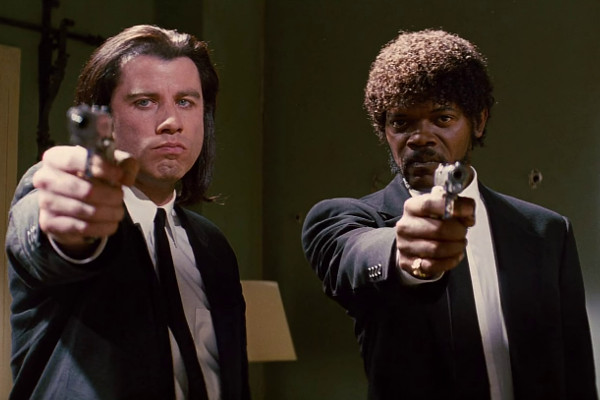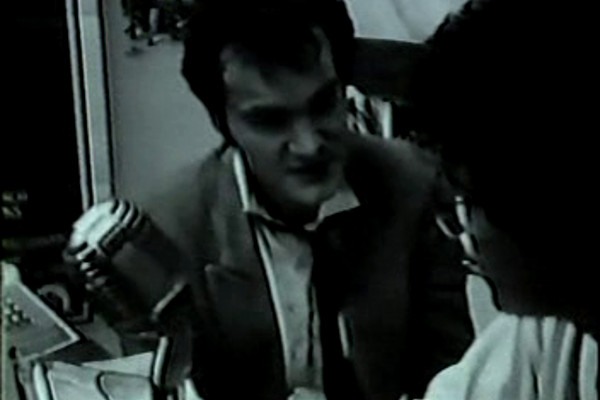


Updated August 2019
All of Tarantino's films, INCLUDING Once Upon A Time... In Hollywood are available from Amazon. To make it easier to find each title, the links are placed under each image - click on each film's picture to take you to the relevant page if you wish to buy them.
An adaptation of some of Frank Miller's Sin City graphic novel stories, directed by Miller himself, with Robert Rodriguez. Rodriguez and Tarantino had collaborated before on a number of occasions, including Rogriguez directing Quentin in From Dusk Till Dawn. After Robert had scored Kill Bill Part II as a favour for a dollar, Quentin returned the favour by directing a small segment of Sin City, also for a dollar.
Innovatively shot on a sound stage in black and white with colour elements, the picture perfectly captures the feel of a comic format, and became much imitated thereafter. However, the deliberately ripe dialogue, spoofing the likes of pulp magazines and film noir, may be less palatable to modern audiences. Tarantino directed a short sequence with Dwight (Clive Owen) driving Jackie Boy (Benicio Del Toro), as pictured above.
Tarantino sharing a segment of a movie was not unique to this project: the animated sequence in Kill Bill Part I was directed by Kazuto Nakazawa, and the film-within-a-film of Inglourious Basterds was helmed, uncredited, by Eli Roth.

Don't mistake the very low placing for Once Upon a Time... in Hollywood as a reflection of the film's total value. There are actually some very good scenes and moments in this work, moments which would, in one sense, place it much higher in this list, above the likes of mid-tier fare like The Hateful Eight and Django Unchained. Indeed, it may leap several places on a rewatch.
However, it debuts in the eleventh spot here by virtue of the narrative choices alone. Initially announced as a look at the Charles Manson family murders, this element is instead used as a backdrop to a tale of '69 Hollywood, though this does make things even more problematic. Tarantino gives us yet another "alternate reality" film, this time mixing fictional characters in with real-life ones, and giving us the bad taste of Sharon Tate not being murdered. However, it's not the only film in 2019 to give us a "famous person never actually died" twist, as viewers of - spoiler - Yesterday would attest.
The significant issue is that it doesn't actually tell audiences who Charles Manson was to any great degree, so unless you're armed with foreknowledge of the historical backdrop - and, let's face it, that's why you pay your ticket - you may be left none the wiser. Even stranger is that, except for one brief example, Tarantino's rammed soundtrack doesn't make use of any of Manson's surprisingly decent music. Then again, Tarantino is more about paying homage to Sharon Tate... or, at least, Sharon Tate's feet.
But the most significant issue is that the plot meanders without really going anywhere, before being wrapped up by narration and a quickee ending. It's a decent 90 minute film stretched out to two-and-a-half hours, a peak of self indulgence from the master of self indulgence. Several inadvisable takes on events (such as making Manson's family members out to be comedic hillbillies) or the styling of Bruce Lee as a braggart are concerns, but of lesser importance than a film that steadfastly refuses to have a rigid plot.
Kill Bill is Tarantino at his most repellent and indulgent, a tribute to Grindhouse Cinema that eschews all sense of good taste. Split into two parts due to a near-four hour runtime, the film shows a pregnant woman beaten unconscious, raped while in a coma, and, in a manga sequence, an 11-year-old girl having sex.
Technically excellent, the picture is of a high standard in terms of pure film making, and Tarantino should, it could be argued, be commended for showing that women also get affected by violence. Yet even though the basic premise was co-devised by Uma Thurman herself, there's more than a whiff of misogyny about the entire project, and perhaps the question should be not why Tarantino would make this film, but why anyone would want to see it.
As a postscript to this review, then reference is made to the producer of Tarantino's films (until Once Upon a Time... in Hollywood) under the entry Death Proof. However, what was not known at the time were various allegations surrounding this particular film, made by Uma Thurman and responded to by Tarantino in February 2018. The allegations - and the term "allegations" is not used to cast doubt on Thurman, but merely for legal reasons - included Tarantino spitting in her face as part of the film, and, most crucially, a car drive she felt coerced to take part in, which ultimately ended in a crash. Although Thurman describes Kill Bill as "a movie that symbolizes female empowerment", this sense of dehumanisation permeates every frame, in a way that the gratuitous female violence in other Tarantino films (including Hollywood) don't quite manage. It's a mean-spirited film, and these later allegations don't, as a result, come as much of a surprise.
After the huge success of Pulp Fiction, Tarantino seemed to be everywhere, from chat shows to bit parts, and even his own starring role in Destiny Turns on the Radio. Four Rooms was an experimental project that saw Tarantino and four other directors plan to create a film set in a hotel, made up of their five separate scripts and linked together as a single movie. Richard Linklater (Slacker/Dazed and Confused) pulled out before production began, leaving the film to be made up of the works of Allison Anders (Gas, Food Lodging), Alexandre Rockwell (In The Soup), Robert Rodriguez (Desperado) and Tarantino himself.
As a low budget indie it has a certain merit, though unfortunately for the movie it was carried into cinemas on Christmas Day with a sizeable promotional push, making back little more than the $4 million production costs. The film has perhaps aged better than expected, whereby it can now be viewed shorn of a hype that it could not possibly hope to accommodate.
Generally the best-received segment is "The Misbehavers", by Rodriguez, though Tarantino's "The Man from Hollywood" is not without a vague charm. As with a lot of Quentin's work, it subverts narrative expectations, in this case recreating a bet based on an old episode of Alfred Hitchcock Presents: a man must flick on his cigarette lighter ten times, or lose a finger. Rather than building any suspense, it opts for a left-field resolution whereby the first strike of the lighter fails.
Loosely linking all four stories is Tim Roth, giving a bizarre, deliberately mannered performance as an eccentric bellhop. Largely a homage to Jerry Lewis (whose 1960 vehicle The Bellhop is even referenced) it would be lost on most of the youthful target audience and so the performance can be distracting without due context. In discussing performances, it should be noted that Tarantino casts himself as the star of his own short, playing a spoilt, egomaniacal hotshot film director. Whatever qualms one might have about Tarantino's insistence on taking acting roles in movies, this is one he's able to pull off to a tee.

Co-written with Craig Hamann, Tarantino's amateur film debut was shot on 16mm over the course of four years. There's a persistent rumour that the film was completed but around half was destroyed in a fire; other sources suggest that this is untrue, and that the 36 minutes or so of remaining footage was all that was ever shot. Possibly such stories are confused with Tarantino's first film, an uncompleted 1983 short Love Birds in Bondage which was destroyed in a fire, reputedly by its director.
As this is a ranking of Tarantino's work as a director, then his efforts as an actor are not included, from an appearance in every one of his films (three of them voice only) down to roles in Little Nicky, From Dusk Till Dawn and more. Allen Garfield was training Tarantino as an actor during the production (and appears here as "Entertainment Magnate") and the work sees Quentin in the lead role as Clarence Pool. Whatever the merits, or lack thereof, in Quentin's professional acting engagements, this is an amateur production and so in context his enthusiasm carries off the part of motormouth Pool, a guy who just wants to buy his best friend the perfect present.
Technically this is easily the weakest film in this ranking, and the film stock is poor. That, and the fact that it's an uncomplete movie means that it's one for fans only. Tarantino was largely a self-taught director and didn't believe in the film school route; all his first mistakes are on film, the learning experience captured. Yet while there's no serious evidence of his later gifts, it has a kind of charm and good-natured enthusiasm that keeps it above some of his films that revel in their own mean-spiritedness.
Another collaboration with Robert Rodriguez, this film sees both men craft their own exploitation cinema homage movie. Fake trailers come before and between the "double feature", including Machete and Hobo With A Shotgun, which went on to be made as films in their own right.
Unfortunately, both films were realised separately outside of America and Canada, and released separately on DVD. Devoid of any context, the purpose of the film isn't as clear, and even Tarantino himself is on record as slating his part of the film, "Death Proof", as the worst film he's made to date. The most notable difference between the original format and its solo outing is that the lapdance sequence doesn't appear in the original, instead having a joke "reel missing" caption card in its place. While such an indulgent project is far from either director at their best, it's perhaps an underrated work, which, had it been released as intended in all territories, would maybe be more regarded.
This particular "worst to best" article has been worked on very slowly, and actually has a 20-month gestation period, far longer than any other article on this site. Consequently it was begun and almost completed long before 2017's mass of allegations against Harvey Weinstein, the Executive Producer of this film, and the Executive Producer of eight other movies in this list. Tarantino movies, even the ones that disguise themselves as "pro-feminist" movies, always had a form of "boy's own" mentality to them, very much shot through the Male Gaze. The use of mistreatment of women as a narrative tool has always been a troubling subtext of Tarantino's work, but since the relevations surrounding Death Proof's Executive Producer came to light, it's made the works even more controversial and difficult to watch.
While it must be acknowledged that, at date of writing, the incidents are still, legally speaking, allegations, it has cast an unfortunate shadow on so much of Tarantino's work. It was tempting to completely avoid discussion of this topic, and not trivialise very serious issues by mixing them in with discussion about movies, but due to the ubiquituous nature of these stories, it became almost impossible not to reference them.